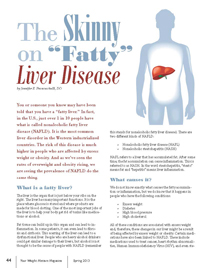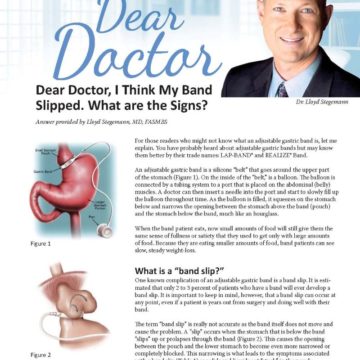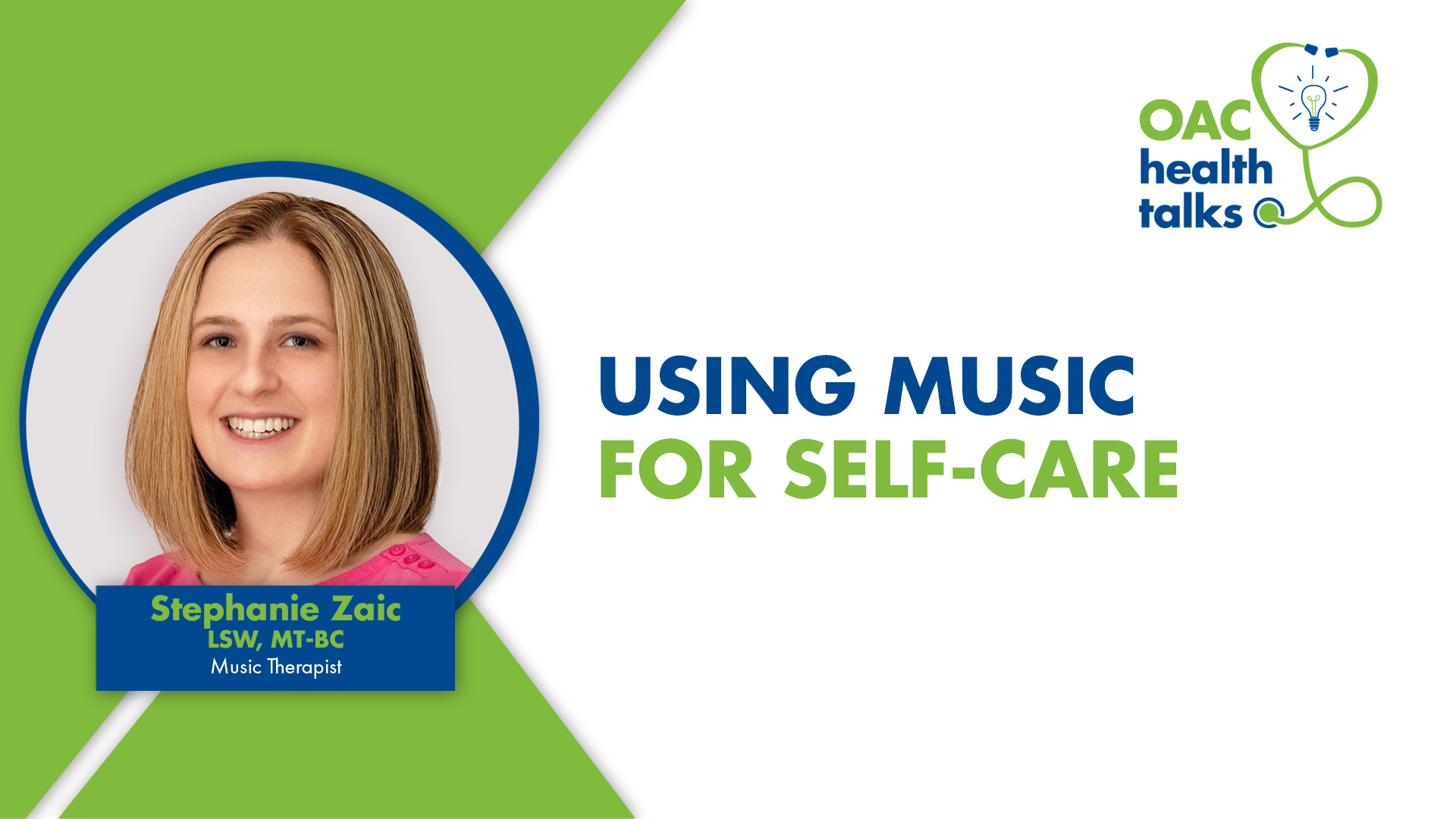The Skinny on “Fatty” Liver Disease


by Jennifer E. Franceschelli, DO
Spring 2013
You or someone you know may have been told that you have a “fatty liver.” In fact, in the U.S., just over 1 in 10 people have what is called nonalcoholic fatty liver disease (NAFLD). It is the most common liver disorder in the Western industrialized countries. The risk of this disease is much higher in people who are affected by excess weight or obesity. And as we’ve seen the rates of overweight and obesity rising, we are seeing the prevalence of NAFLD do the same thing.
What is a fatty liver?
The liver is the organ that is just below your ribs on the right. The liver has many important functions. It is the place where glucose is stored and where products are made for blood clotting. One of the most important jobs of the liver is to help your body get rid of toxins like medications or alcohol.
Fat tissue can build up in this organ and can lead to inflammation. In some patients, it can even lead to fibrosis and cirrhosis. This scarring of the liver can lead to a dysfunctional liver. People who are heavy alcohol drinkers could get similar damage to their livers, but alcohol is not thought to be the cause of people with NAFLD (remember this stands for nonalcoholic fatty liver disease). There are two different kinds of NAFLD:
- Nonalcoholic fatty liver disease (NAFL)
- Nonalcoholic steatohepatitis (NASH)
NAFL refers to a liver that has accumulated fat. After some time, the fat accumulation can cause inflammation. This is referred to as NASH. In the word steatohepatitis, “steato” means fat and “hepatitis” means liver inflammation.
What causes it?
We do not know exactly what causes the fatty accumulation or inflammation, but we do know that it happens in people who have the following conditions:
- Excess weight
- Diabetes
- High blood pressure
- High cholesterol
All of these conditions are associated with excess weight and, therefore, these changes in our liver might be a result of being affected by excess weight or obesity. Certain medications have also been linked to NAFLD. These include medications used to treat cancer, heart rhythm abnormalities, Human Immunodeficiency Virus (HIV), and even steroids. If you are on one of these medications and concerned about liver disease, then you should talk with your doctor. You should NOT stop these medications without seeking medical attention for advice first.
Can children get NAFLD?
Yes. The incidence of overweight and obesity has been increasing throughout the past few decades. Unfortunately, this has extended to our children as well. As a result, NAFLD has been seen more and more in children too. Children have similar symptoms and treatments as adults.
What are the symptoms?
Most people do not have any symptoms. However, some people can complain of right upper quadrant pain, fatigue or general body discomfort.
How is it diagnosed?
It can be found on routine blood work. A liver function test (LFT) looks at your liver enzymes to help determine the health of your liver. These enzymes are often elevated in NAFLD but can be normal in some cases. If your liver enzymes are elevated, your doctor may get additional blood tests to look for other causes of this abnormality like infection, autoimmune disorders or iron disorders.
Your doctor may also order an ultrasound of your liver. This is a test where a gel-like material is spread on the skin overlying your stomach and a probe is placed on this same area. This will give a picture of your internal organs. It can show if there is any fat accumulation or inflammation in your liver. Other imaging, like a CT or MRI scan, may also be done but are often not needed. In rare cases, a liver biopsy is needed to make the diagnosis. This is where a very small sample of your liver is taken and then examined underneath a microscope for any signs of fat accumulation, inflammation, scarring or fibrosis. Your doctor will review your case and decide which tests are right for you.
How is it treated?
There are many treatments being studied, and the best treatment so far is weight-loss. A weight-loss of no more than 3.5 pounds per week can reduce fat accumulation and improve inflammation. A rapid weight-loss of more than 3.5 pounds a week can actually worsen the disease.
Here are a few helpful tips to get you started:
1. Avoid unnecessary medications or over-the-counter supplements.
2. Avoid drinking excessive alcoholic beverages.
3. Eat a well-balanced diet.
4. Increase your physical activity.
5. Avoid simple and refined sugars.
6. Avoid sugary drinks like juice and soda.
These may seem like standard recommendations, but they can really help to reduce the fat accumulation and inflammation in the liver. Your doctor may start you on a Vitamin E supplement as some studies have shown that this can improve NAFLD.
People who have NAFLD are at a higher risk for heart problems. Your doctor will want to make sure your heart is healthy. This means making sure your blood pressure and sugars are well-controlled and that your cholesterol is in an acceptable range.
Why should you be treated?
If this condition is left untreated, it can lead to cirrhosis of the liver. This means that your liver has been scarred and may not function properly. It can cause clotting problems, confusion, yellow eyes/skin (jaundice), nausea, blood in stools, weakness and low blood counts. It can even lead to cancer. This is why it is so important to follow-up with your doctor even though you may not be experiencing any symptoms.
What can you do if you think you have a fatty liver?
You should discuss your concerns with your doctor. In the meantime, if you are affected by excess weight or obesity, you might consider trying to eat healthier and increase your exercise regimen since weight-loss is your best treatment option. You should continue taking all of your medications, but be sure to bring up any concerns about your medicines to your doctor. They will be able to determine if you are at risk and what steps you should take next.
About the Author:
Jennifer E. Franceschelli, DO, is a physician training in bariatric medicine and nutrition at Geisinger Medical Center. She earned her bachelor’s degree in cellular and molecular biology at West Chester University and completed medical school at Philadelphia College of Osteopathic Medicine. She has an interest in pediatric obesity and is a strong proponent of the multi-disciplinary approach in the prevention and treatment of obesity.
by Nina Crowley, PhD, RD (with Inspiration from Shawn Cochran) Winter 2024 Dating, no matter your age,…
Read Articleby Sarah Ro, MD; and Young Whang, MD, PhD Fall 2023 Mary, a postmenopausal woman with a…
Read ArticleDid you know that stress can have an impact on weight? Many people increase their food intake…
View Video









